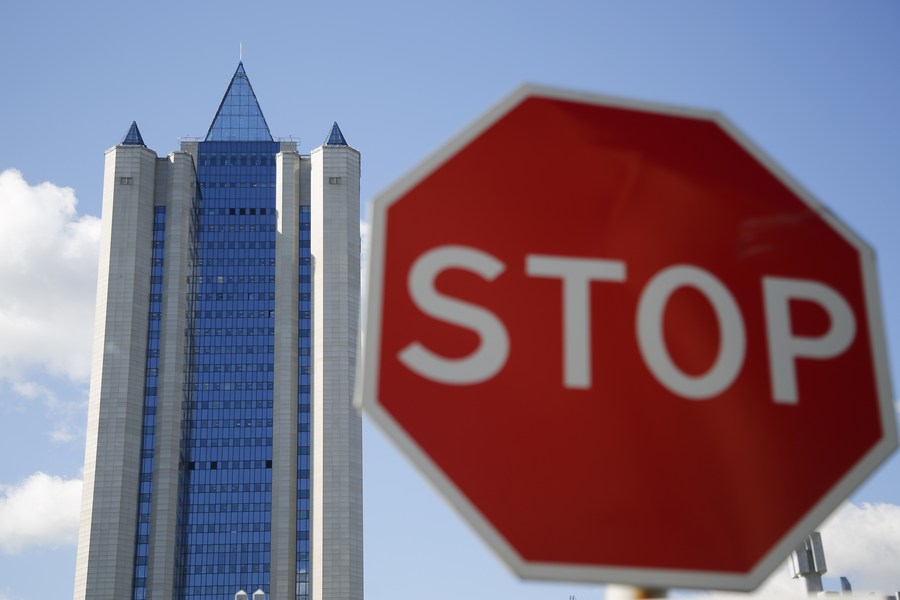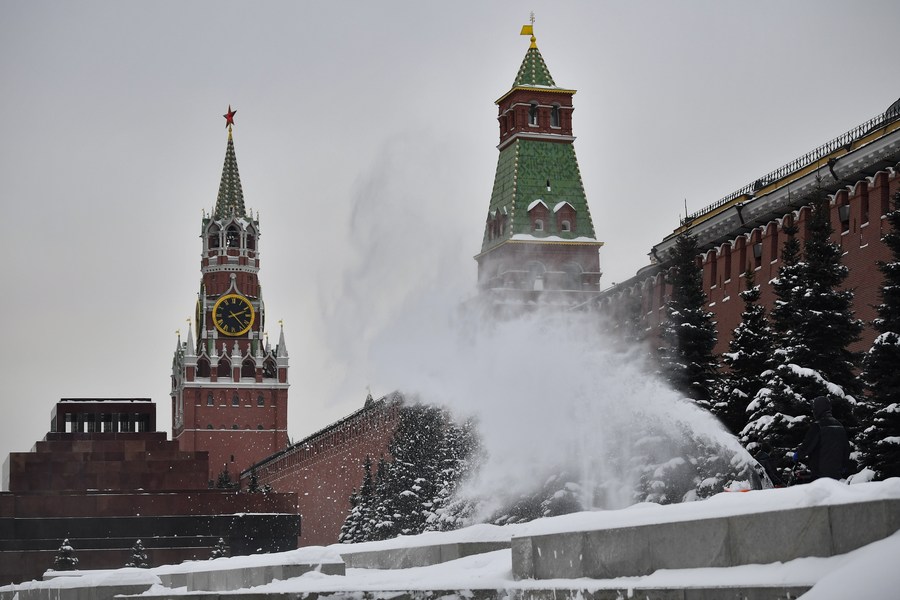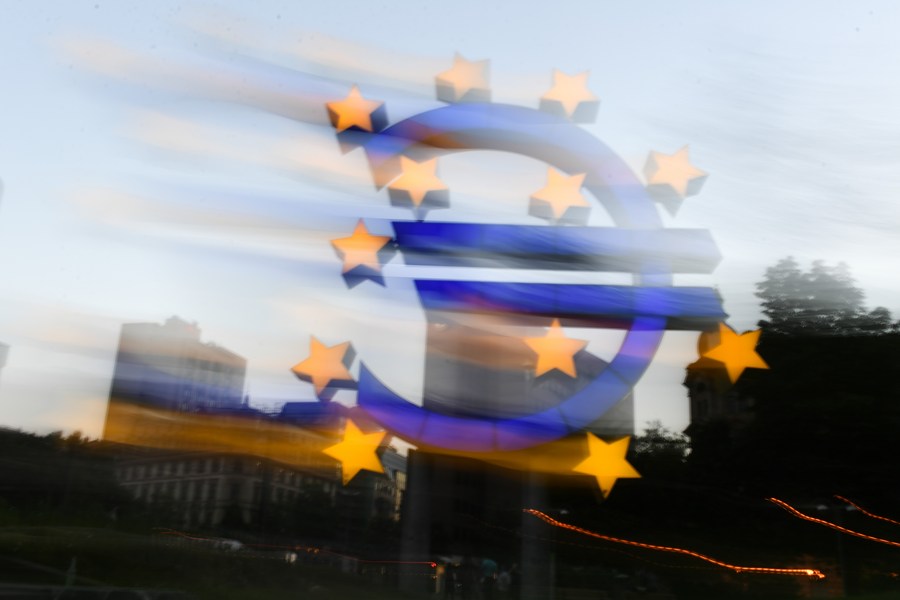Prolonged conflict batters economies of Russia, Ukraine, hinders world recovery

A woman walks past a destroyed shop in Kharkov, Ukraine, June 1, 2022. (Photo by Peter Druk/Xinhua)
With the fallout from the crisis wrecking havoc on the world, Washington is busy pocketing billions by selling massive weaponry and overpriced fuel to its European allies.
MOSCOW, Dec. 23 (Xinhua) -- With no positive sign in sight for a quick end to the Russia-Ukraine conflict, governments and economists are now increasingly worried about its economic impact, not only on Ukraine, Russia and other European nations, but also on the whole world.
The crisis is depleting the Ukrainian economy and significantly retarding the world's post-pandemic recovery, analysts say.
UKRAINE IN RECESSION
Ukraine has suffered bitterly from the conflict, with its economy now mired in a severe recession.
Yulia Svyrydenko, Ukraine's first deputy prime minister and economy minister, predicted at a recent briefing that the country's GDP would plummet by 32-33.5 percent in 2022 due to energy infrastructure damage.
The Ukrainian government, the European Commission and the World Bank estimated in September that the cost of reconstruction and recovery in Ukraine amounted to 349 billion U.S. dollars, which was more than 1.5 times Ukraine's GDP last year, with the figure expected to grow as the conflict rages on.

A harvester operates at a farm in Chernihiv, Ukraine, July 30, 2022. (Xinhua/Li Dongxu)
At the same time, Ukrainian government debt grew to 103.1 billion dollars as of the end of October. Borrowing to cover the budget deficit was the main reason for the hike, said Daniil Getmantsev, head of the Verkhovna Rada (parliament)'s committee on finance, tax and customs policy, in November.
Ukrainian President Volodymyr Zelensky said in October that his country needed 38 billion dollars to cover next year's estimated budget deficit and another 17 billion dollars to rebuild critical infrastructure.
Half of Ukraine's energy infrastructure was damaged during 10 months of combat, according to Zelensky.
Kiev "could be left without international reserves to pay for critical imports and unable to meet its foreign debt obligations," The Washington Post reported last week.

Photo taken on April 28, 2022 shows the office of Russia's energy giant Gazprom in Moscow, Russia. (Photo by Alexander Zemlianichenko Jr/Xinhua)
LIMITED IMPACT ON RUSSIA
Since the start of the conflict, Western countries have imposed rounds of finance, trade and energy sanctions, which Russian President Vladimir Putin said were aimed at crushing the Russian economy, wrecking the ruble and provoking devastating inflation.
Analysts say Russia has withstood the impact of sharp ruble depreciation and the departure of Western companies in droves, stabilized the financial system and preserved its economic order. Russia also benefits from selling its energy, which remains in broad demand.
"The contraction in Russia's economy is less severe than earlier projected, reflecting resilience in crude oil exports and in domestic demand with greater fiscal and monetary policy support and a restoration of confidence in the financial system," said the International Monetary Fund in its October World Economic Outlook.
One of the main goals of the Western sanctions was to limit Russia's access to oil and gas markets. But energy prices rose higher, allowing Russia to grow its coffers, said Valery Krutikov, professor of economics at Russia's Kaluga State University.
"This plan has failed. The Russian business community and government bodies worked in a well-coordinated and professional manner, and our citizens displayed unity and responsibility. The government, the Bank of Russia and the Russian regions have stabilized the situation by pooling their efforts," Putin told a government meeting earlier this month.

A worker removes snow at the Red Square in Moscow, Russia, Dec. 21, 2022. (Photo by Alexander Zemlianichenko Jr/Xinhua)
Putin said that Russia's gross domestic product is expected to contract by 2.5 percent in 2022, much better than a 20 percent decline previously forecast by many Western experts.
After a surge in March and April, inflation has stabilized since May, while the federal budget deficit is expected to remain at a low level of about 2 percent of the GDP this year and next year, he added.

Photo taken on June 1, 2022 shows the Euro sculpture in Frankfurt, Germany. (Xinhua/Lu Yang)
GLOBAL RECESSION FEARED
The European countries have been hard hit by the spill-over effects of the conflict, suffering under painfully high energy prices. As the share of Russian natural gas supply on the European market fell from 40 percent last year to 9 percent this year, European countries have been forced to buy much more expensive American liquefied natural gas.
Moreover, the soaring energy prices are forcing a large number of European energy-intensive plants to curtail or even terminate production, which is a sign of expanding deindustrialization in Europe. If the trend continues, the industrial structure of Europe may be eroded for good, industry observers have warned.
For the world economy, the Ukrainian crisis was the "single most important negative factor" this year, and likely the next, IMF Managing Director Kristalina Georgieva said in November.
The Organization for Economic Cooperation and Development predicted in November that the world economy would grow 3.1 percent this year and 2.2 percent next year. The IMF forecast that growth in 2023 would slow down to 0.5 percent in the eurozone and 1 percent in the United States.
World Bank President David Malpass warned that the Russia-Ukraine conflict and its impact on food and energy prices and the availability of fertilizers could trigger a global recession. Developing countries would be hit even harder.

A man walks out a store in Basingstoke, Britain on Nov. 13, 2022. (Photo by Tim Ireland/Xinhua)
Meanwhile, with the fallout from the crisis wrecking havoc on the world, Washington is busy pocketing billions by selling massive weaponry and overpriced fuel to its European allies.
Since late February, European Union countries have pledged to beef up their arsenals by some 230 billion dollars, U.S. media outlet Politico reported in October. The American arms industry has been a significant beneficiary.
Eighty-seven cargo ships departed from U.S. ports in September carrying 6.3 million tons of liquefied natural gas, and almost 70 percent of that cargo headed to Europe, Refinitiv Eikon data showed. According to various European media outlets, each vessel can result in 100 million dollars of profit.
Photos
Related Stories
Copyright © 2022 People's Daily Online. All Rights Reserved.









